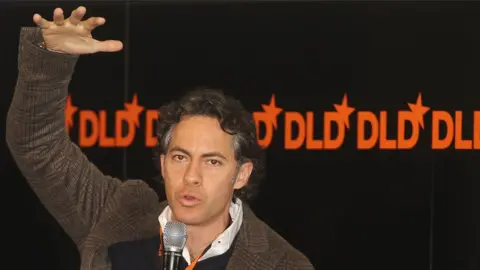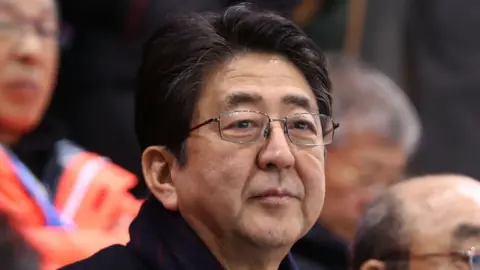Winter Olympics: NBC ditches analyst Joshua Cooper Ramo over Korea remark
 Getty Images
Getty ImagesNBC has removed one of its Olympic analysts after he made a comment about Japan and South Korea which sparked anger among South Koreans.
Joshua Cooper Ramo said Japan, which occupied Korea from 1910-45, had served as a key "example" in South Korea's transformation.
South Koreans called the comments, during the opening ceremony of the Winter Olympics, ignorant and hurtful.
A petition calling for an apology from NBC drew more than 13,000 signatures.
 Getty Images
Getty ImagesMr Ramo's comments came as he noted Japanese Prime Minister Shinzo Abe's attendance at the Pyeongchang Games.
He described Japan as a "country which occupied Korea from 1910 to 1945" and added: "But every Korean will tell you that Japan is a cultural, technological and economic example that has been so important to their own transformation."
'Hurtful and ignorant'
Many South Koreans have used social media to express their anger, including posting heated comments on NBC's pages.
"You owe a formal apology to the Korean nation for diminishing and ridiculing our painful history during the years of Japanese colonization," said one commenter on NBC's Instagram page.
"Many of our grandfathers and grandmothers were killed by [Japan] and young girls forced to be comfort women. NBC should not say that," another added, referencing the controversial use of South Korea women, many of them forced, in Japanese military brothels.
"Your comments were hurtful and ignorant. Put in some effort to study the country hosting the Olympics," one Instagram user said.
Mr Ramo is vice chairman and co-CEO of the Kissinger Associates consulting firm and has written extensively on Asian economics and politics.
NBC, the exclusive US broadcaster of the Olympic Games, initially apologised for Mr Ramo's remarks. But it later said he would not be appearing in further Olympics coverage.
They said he had been hired as an Asia expert for the Olympics "to give an overview to our viewers of the host country and this region of the world".
"It was possible for him to do more with us here; now it is no longer possible," an NBC spokesman told the Korea Times.
Japan has issued several apologies for its occupation of the Korean peninsula, which saw Koreans forced to fight on the frontline, to work as slaves or in brothels.
But the occupation, particularly the issue of forced sex slavery, remain deeply sensitive for many in South Korea.
